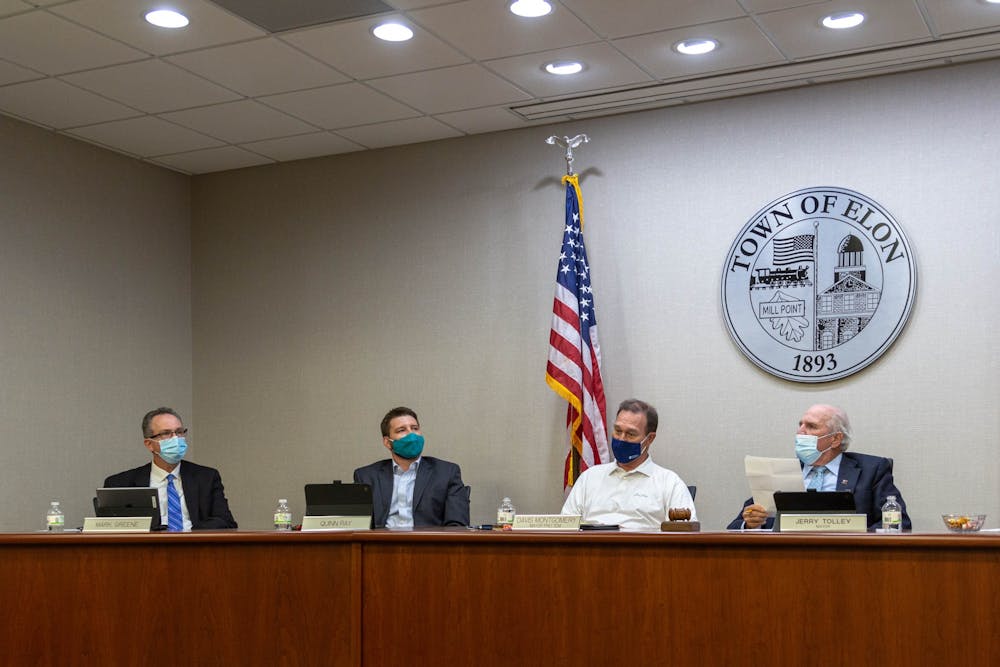The town of Elon Board of Aldermen met for an agenda session on Sept. 7 to discuss the formation of an ordinance and policy review committee, changes to monthly billing for water and sewing services, financial incentives for the town’s police department and amendments to policies regarding COVID sick leave and vaccine incentives.
Discussion of forming ordinance and policy review committee
In accordance with the board's recent adoption of an equality resolution, members of the Board of Aldermen discussed the formation of an ordinance and policy review committee. The committee will review town of Elon ordinances and policies for discriminatory impacts. The groups would also make recommendations to the mayor and board for revisions to ordinances and policies, if discriminatory impacts were found.
The committee will consist of five appointed members, including residents, business owners, or private employees within the town of Elon. Alderwoman Emily Sharpe said she wished to see one town employee and two Aldermen to sit on the committee as non-voting members.
“There does need to be a moderator, if you will, to get it started, to lead that charge,” Sharpe said. “Maybe they’re not the chairperson, maybe they’re the staff liaison and then the chairperson takes that on, but I do think that’s a necessity for sure.”
Sharpe and Alderman Quinn Ray said they felt the committee should meet for at least a year from the committee’s first meeting, instead of six months. Meeting for a year would allow the town to see progress in how having the committee would help to mitigate discriminatory impacts in town of Elon ordinances and policies.
“We definitely want to make it clear to whoever is going to apply on this committee that there’s going to be a duty,” Ray said. “[For] at least a year, this is what we’re going to be looking at.”
Conversations of the ordinance and policy review committee remain ongoing and members of the board said they hope to start actively looking to recruit members for the committee in the future.
Discussion of raising litter fines
During a public hearing in the meeting, several members of the board said they had concerns about ongoing littering and solid waste issues within the town. Sharpe said she noticed this issue especially among residences Elon University students live in.
To combat the current issues related to littering and trash, the board reaffirmed that littering on any public or private property is illegal and also considered it a public nuisance. There was also discussion about raising fines for littering. Aldermen Davis Montgomery proposed raising the first offense to $100, the second offense to $150 and the third offense to $500. Previous fines were $50 for the first offense, $100 for the second offense and $250 for the third offense.
Montgomery said littering is not an accident and hopes to keep residents accountable for their actions.
Changes in COVID-19 vaccine incentives, sick leave for town employees
Members of the Board of Aldermen also discussed having incentives for town employees who are vaccinated against COVID-19. This comes after only 47% of town employees reported they were fully vaccinated.
Proposed incentives included having a cash incentive of two hundred dollars for town employees who showed proof of complete vaccination by November 1, along with an incentive for workers to receive two paid days off if they showed they were completely vaccinated.
Rich Roedner, the town of Elon manager, said the board was also considering extending up to 40 hours of COVID-19 sick leave for town employees if they were required to quarantine due to being a close contact of someone who tested positive for COVID-19, or was missing work to become vaccinated.
“It’s another tool that’s available to us to help stop the spread of COVID and help us maintain services,” Roedner said.
Additionally, Sharpe suggested the board should look into offering COVID-19 testing for all town employees, hoping to provide more accessibility to tests and keep the community safe. She recommended the town should implement a similar testing system the university had last year, where all employees would take a rapid antigen test and if the results came back positive employees would get a PCR test.
“It’s beneficial in identifying cases before they’re symptomatic and there has been a lot of success in that,” Sharpe said.


